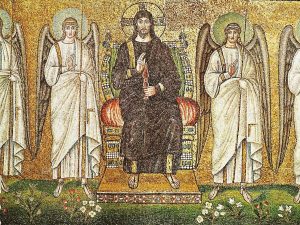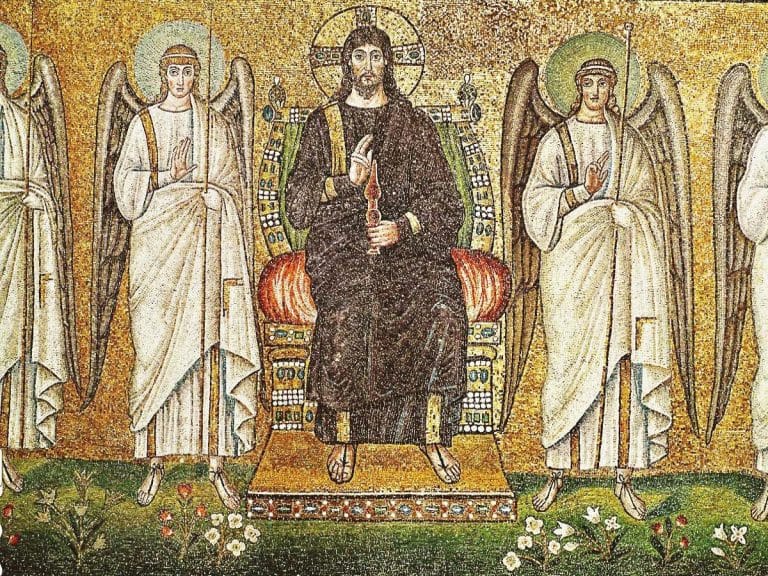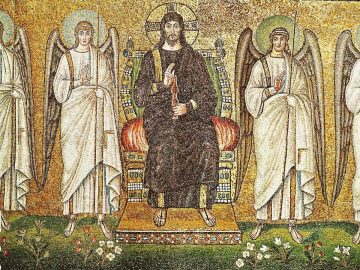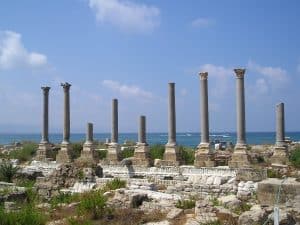
On Easter Sunday in 2016, I stood up in my Community of Christ congregation and walked to the pulpit. It was my job to give the message (sermon) and in those 10 or so steps, I had an awkward epiphany: I realized that I no longer believed in the resurrection or divinity of Jesus.
It was something I had been skirting around for a few months, but was reluctant to fully consider. I don’t remember what I said in the wake of that moment, but I do remember feelings of great disappointment. I had lost Jesus and with him all of the love and assurance that I had leaned on for support and comfort. I envisioned him enthroned in heaven and watching over me. I had been taught to take comfort in that image, derived from the visionary experiences of ancient men whose worlds were so different from mine; men who never saw women in heavenly spaces, who were drawn to the idea of God as the emperor ruling over earth and heaven. Kings and kingdoms. Hierarchy and power. Authority and empire.
Neither the loss of Jesus nor my idea of Divine Jesus sat easily with me at that time. But who could Jesus be without resurrection and divinity? What could be left after those patriarchal pieces vanished? I feared a knock-on effect that would result in losing my whole belief in God. I saw that I had many beliefs that were not sustainable for me, but I didn’t know how to transform them into something that would be personally meaningful and enduring.
In the year since that ill-timed realization, I came to understand that the parts of Jesus that were most compelling to me were the human parts. Human Jesus was the great teacher who called on his followers to love their neighbors. Human Jesus was the great ally who asked the men sitting in judgement of the adulterous woman to examine themselves before executing her. Human Jesus was the great disruptor who preached the parable of the good Samaritan and the resistor who taught the beatitudes. It didn’t take miracles for Jesus to see and affirm the worth and humanity of those who were pushed to the margins of society. It did take compassion, empathy, and moving beyond comfort, propriety, and tradition. This was and is the path of Jesus.
Today is Easter Sunday one year later. I see that Human Jesus is brought to life when people continue the work of peace and justice in their communities. Human Jesus asks me to negotiate a temporal salvation with my neighbors, to affirm their value and dignity. May we find the strength to continually resurrect Human Jesus.





6 Responses
Thanks for your thoughts. I too have been seeking to hold onto the human parts of Christ while retaining a belief in God. It’s hard to piece things back together once you find out that doctrines that once had deep religious significance were not what you thought. May you continue to receive inner guidance.
Thank you so much for this piece. I read it while sitting in sacrament meeting on Easter. I’d just performed with the choir, and this resonated with me. I move forward in my faith journey with some trepidation, but your words offer me great comfort.
I find the concept of anything other than Human Jesus difficult. To me Heavenly Father and Mother, together with Jesus, are human. Sure they are further along the Human path than us, but thinking of them as anything other than human doesn’t make sense.
I realise that you are, at least in part, referring to mortal Jesus when you say human. However, it is the fact that gods are human that gives sense to the Plan of Salvation.
Thank you for this , Dr. Ross.. To come to the truth of Jesus as human is a long, winding journey when you start from such a strict belief system. I know how you strive to be Christ-like. That is the teaching that he wanted us to learn. For me, it is what makes him immortal, or maybe all-mortal. I know when a person accepts the Human Christ, it allows them to see other great spiritual leaders as human too. The Buddha was a man, too. The ancient goddesses/gods were reflections of humans. We are one, that is the lesson.
Nancy,
Thanks for writing and sharing this. In this, you’ve expressed something similar to my own evolving feelings about faith.
One thing that I’d add, from my perspective, is the beauty of forgiveness as told in the story of atonement. It gives me the power to forgive others, to forgive myself, and to let go of anger.
Thanks again for sharing.
[…] holidays after a faith transition can be tricky. Two years ago, I wrote about speaking to my congregation on Easter Sunday. I finally answered my own question about the Resurrection on my short walk to the pulpit to give […]